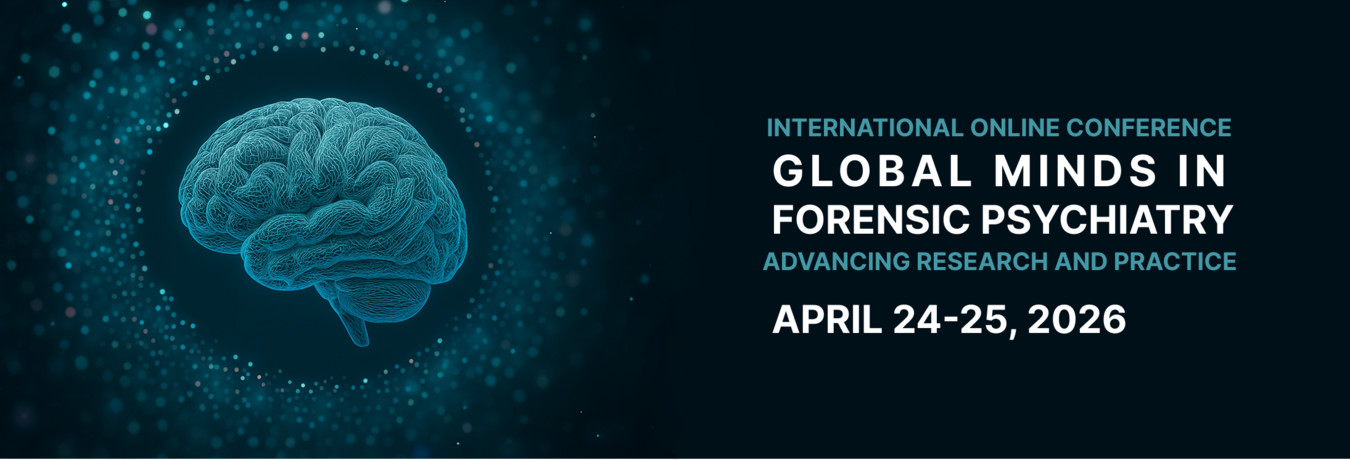Programm
Friday, 24 April 2026 (Day 1)
All times in CET (Central European Time)
09:00 – 09:15 AM
Opening and Welcome (Dr. Michael Fritz)
09:15 – 10:00 AM
Keynote Lecture 1: Ethical Pros and Cons of Research on Particularly Vulnerable Patient Populations
PD Dr. Irina Franke (Center for Forensic Psychiatry, Chur, Switzerland)
10:00 – 10:15 AM
Short Break
10:15 – 11:00 AM
Parallel Sessions
Session 1: Novel IT-based Treatment Options in Forensic Psychiatry (session host: Dr. Michael Fritz)
Talk 1: AVATAR therapy for distressing voices: lessons learnt and future directions
Prof. Dr. Mar Rus-Calafell (Ruhr-University Bochum, Bochum, Germany)
Talk 2: The clinical applications of Virtual Reality in Alcohol Use Disorder
Dr. Alexandra Ghita (Aspris by alkalma United for Health and Wellbeing, Dubai, United Arabic Emirates)
Session 2: Novel Treatment Options for Psychosis and Delusions in Forensic Psychiatry (session host: Prof Dr. Manuela Dudeck)
Talk 1: Advances in Catatonia: From Diagnosis to Evidence-Based Treatment
Prof. Dr. Dusan Hirjak (Central Institute for Mental Health Heidelberg, Heidelberg, Germany)
Talk 2: Neurostimulation and Cognition in Psychosis: Mechanisms and Clinical Perspectives
Dr Panayiota Michalopoulou (King’s College London, London, United Kingdom)
11:00 – 11:15 AM
Short Break
11:15 AM – 12:00 PM
Keynote Lecture 2: Premature mortality among offenders with serious mental illness: lessons from forensic psychiatric patients and high-risk groups
Prof. Dr. Björn Hofvander (Lund University, Lund, Sweden)
12:00 – 1:15 PM
Lunch Break
1:15 – 2:00 PM
Keynote Lecture 3: The AIS and eHARM: a new set to tools for managing violence using big data
Prof. Dr. Gary Chaimowitz (McMaster University, Hamilton, Canada)
2:00 – 2:15 PM
Short Break
2:15 – 3:00 PM
Parallel Sessions
Session 3: The Genetics of Aggression – Current Understanding and Emerging Treatment Implications (session host: Prof. Dr. Manuela Dudeck)
Talk 1: Differentially expressed Gene pathway-analysis implicates the immune system, lipid metabolism, and neuroplasticity markers in aggression and violence
Dr. Michael Fritz (Ulm University, Ulm, Germany)
Talk 2: Genes and environment in shaping human behavior: legal and forensic perspectives
Prof. Dr. Silvia Pellegrini (University of Pisa, Pisa, Italy)
Session 4: Brain anatomical correlates of aggression and anti-social behavior across clinical and population cohorts (session host: Prof. Dr. Unn Hansen Hauvik)
Talk 1:Mapping cerebellar subregional volumes and heterogeneity in psychosis and violence
Dr. Thomas Fischer-Vieler (University of Oslo, Oslo, Norway)
Talk 2: Multimodal Correlates of Aggression and Agitation in Early Psychosis and Depression: Integrating Brain Structure, Polygenic Risk, and Social Adversity
Clara Weyer (Ludwig Maximillian University Munich, Munich, Germany)
Talk 3: Early indicators of conduct disorder in the developing brain: structural insights from ages 9-14 in the ABCD Study
Dr. Jaroslav Rokicki (Oslo University Hospital, Oslo, Norway)
3:00 – 3:15 PM
Short Break
3:15 – 4:00 PM
Parallel Sessions
Session 5: Substance use disorders within forensic psychiatric care: symptoms, subgroups and treatment (session host: Prof. Dr. Malin Hildebrand Karlén)
Talk 1: Community reinforcement approach applied in an FPC in-patient setting
Prof. Dr. Malin Hildebrand Karlén (Gothenburg University, Gothenburg, Sweden)
Talk 2: Co-morbidity subgroups within forensic psychiatric care
Johan Green (Gothenburg University, Gothenburg, Sweden)
Talk 3: Drug induced psychosis – transient and chronic symptoms
Cajsa Jonasson (Gothenburg University, Gothenburg, Sweden)
Session 6: Current research in German Forensic Psychiatry (session host: Prof. Dr. Birgit Völlm)
Talk 1: Involving service users in research in forensic psychiatry
Prof. Dr. Birgit Völlm (Rostock University, Rostock, Germany)
Talk 2: Developing a national database on forensic-psychiatric patients
Dr. Katja Köppen (Rostock University, Rostock, Germany)
Talk 3: Patterns of substance use in a forensic-psychiatric hospital in Germany
Finn Sörensen (Rostock University, Rostock, Germany)
4:00 – 4:15 PM
Concluding Remarks (Day 1)
Saturday, 25 April 2026 (Day 2)
All times in CET (Central European Time)
09:00 – 09:15 AM
Opening Remarks (Day 2)
09:15 – 10:00 AM
Keynote Lecture 4: Long lasting impacts: The role of childhood adversity for treatment completion
Prof. Dr. Hedwig Eisenbarth (Victoria University of Wellington, Wellington, New Zealand)
10:00 – 10:15 AM
Short Break
10:15 – 11:00 AM
Keynote lecture 5: Should Biological Markers Be Included in Forensic Psychiatric Reports?
Prof. Dr. Unn Hansen Haukvik (University of Oslo, Oslo, Norway)
11:00 – 11:15 AM
Short Break
11:15 AM – 12:00 PM
Parallel Sessions
Session 9: Risk of recidivism and development of risk assessment in the Nordics (session host: Dr. Markku Lähteenvuo, Niuvanniemi Hospital, Kuopio, Finland)
Talk 1: Finnish forensic psychiatric care and subsequent recidivism
Dr. Markku Lähteenvuo (Niuvanniemi Hospital, Kuopio, Finnland
Talk 2: Swedish forensic psychiatric care and subsequent recidivism in violent crime
Dr. Jonas Forsman (Karolinska Institutet and The Swedish National Board of Forensic Medicine, Stockholm, Sweden)
Talk 3: Beyond Categories: Temporal Validation and Clinical Refinement of Risk Assessment Tools for Modern Forensic Psychiatric Practice
Lenka Sivak (Karolinska Institutet and The Swedish National Board of Forensic Medicine, Stockholm, Sweden)
Session 10: Investigations into personality traits and attentional processes in offenders (session host: Prof. Dr. Schiltz, LMU Munich, Munich, Germany)
Talk 1: Personality Profiles Across Offender Subgroups
Susanne Schobel, M. Sc. (LMU Munich, Munich, Germany)
Talk 2: Gaze Behaviour towards children in pedophilia and hebephilia
Puyan Heindl, M. Sc. (LMU Munich, Munich, Germany)
12:00 – 12:15 PM
Short Break
12:15 – 1:00 PM
Keynote Lecture 6: The New Science of Risk Assessment: Implications for Forensic Psychiatry & Psychology
Prof. Dr. Seena Fazel (University of Oxford, Oxford, United Kingdom)
1:00 – 1:30 PM
Concluding Remarks (Final Summary)
